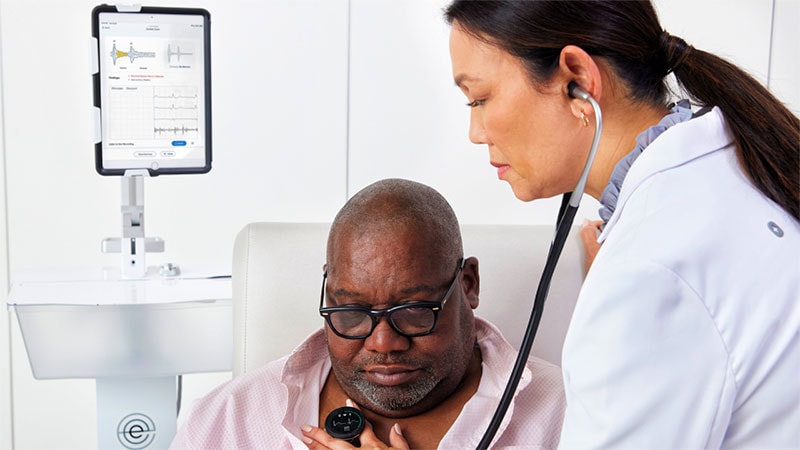AI-Aided Stethoscope Outperforms PCP in Detecting Valvular Heart Disease
Core Concepts
AI-powered stethoscopes are more effective in detecting valvular heart disease than traditional methods.
Abstract
The study highlights the superiority of AI-assisted stethoscopes in detecting valvular heart disease compared to primary care physicians. The AI technology improves sensitivity and can identify specific types of murmurs, potentially revolutionizing cardiac care. The content discusses the study's methodology, results, and implications for healthcare.
Key Highlights:
AI-powered stethoscope detects heart murmurs associated with valvular heart disease more accurately than traditional methods.
Timely detection of VHD can prevent severe symptoms, emergency room visits, and surgeries.
The study enrolled a real-world population to assess the effectiveness of the AI tool.
AI significantly improved sensitivity in detecting audible VHD compared to PCP auscultation.
The technology has the potential to be used beyond primary care settings.
AI-Aided Stethoscope Beats PCP in Detecting Valvular HD
Stats
"Clinically significant VHD, indicating structural damage to heart valves, affects 1 in 10 adults older than 65 years."
"The study enrolled a 'real-world' population of 368 patients, median age 70 years, 61% female, 70% White, and 18% Hispanic without a prior VHD diagnosis or history of murmur."
"AI improved sensitivity to detect audible VHD by over twofold compared with PCP auscultation (94.1% vs 41.2%)."
Quotes
"Incorporating this AI-assisted device into the primary care exam will help identify patients at risk for VHD earlier and eventually decrease costs in our healthcare system."
"You don't want to miss those patients because the consequences of undiagnosed VHD are dire."
"Use of these new tools to detect the presence of valvular disease, as well as the extent of valvular disease and the extent of other kinds of heart disease, will likely help to transform CVD care."
Key Insights Distilled From
by Pauline Ande... at www.medscape.com 12-13-2023
https://www.medscape.com/viewarticle/ai-aided-stethoscope-beats-pcp-detecting-valvular-hd-2023a1000vca
Deeper Inquiries
How can AI-assisted stethoscopes impact healthcare costs in the long term?
AI-assisted stethoscopes can have a significant impact on healthcare costs in the long term by enabling early detection of conditions such as valvular heart disease (VHD). Timely identification of VHD through AI technology can lead to interventions at an earlier stage, potentially avoiding costly emergency room visits and surgeries. By detecting VHD earlier, AI-assisted stethoscopes can help prevent the progression of the disease to more severe stages, ultimately reducing the financial burden on the healthcare system. Additionally, the use of AI in healthcare can streamline processes, improve diagnostic accuracy, and optimize resource allocation, all of which contribute to cost savings in the long run.
What are the potential ethical implications of relying heavily on AI for medical diagnoses?
Relying heavily on AI for medical diagnoses raises several ethical implications that need to be carefully considered. One concern is the potential for overreliance on AI, leading to a reduction in human oversight and decision-making. This could raise issues of accountability and responsibility if errors occur in the diagnostic process. Additionally, there are concerns about data privacy and security when using AI systems that collect and analyze sensitive patient information. Ensuring the transparency and explainability of AI algorithms is crucial to maintain trust in the diagnostic process. Furthermore, there may be ethical considerations related to the equitable access to AI technology in healthcare, as disparities in access could exacerbate existing healthcare inequalities.
How can the integration of AI technology in healthcare be accelerated to benefit a larger population?
The integration of AI technology in healthcare can be accelerated to benefit a larger population through several strategies. Firstly, investing in research and development to enhance the capabilities and accuracy of AI algorithms for medical applications is essential. Collaborations between technology companies, healthcare providers, and regulatory bodies can facilitate the development and implementation of AI solutions in clinical settings. Education and training programs for healthcare professionals on how to effectively use AI tools can promote their adoption and integration into routine practice. Additionally, establishing clear regulatory frameworks and standards for AI in healthcare can help ensure patient safety and data privacy. By fostering a collaborative and supportive ecosystem for AI innovation in healthcare, the benefits of this technology can reach a broader population.
0
